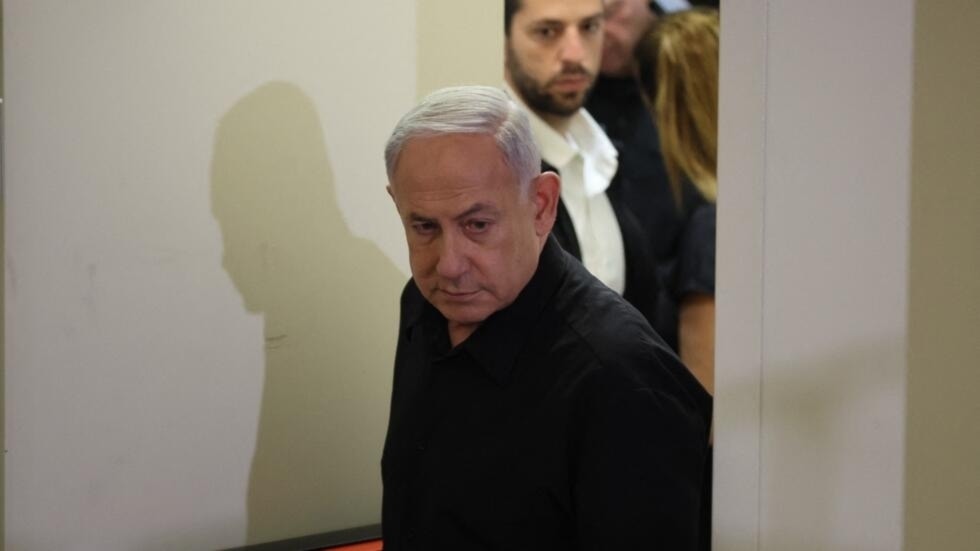Netanyahu faces growing challenges, dilemmas with no proposed answers
A Financial Times editorial says as the Israeli Prime Minister continues to resist the US, he is risking to isolate "Israel" further.
-

Israeli Prime Minister Benjamin Netanyahu attends a press conference in "Tel Aviv", occupied Palestine, on October 28, 2023 (AFP)
The current direction of Israeli Prime Minister Benjamin Netanyahu in the ongoing war on Gaza is "to continue the fighting," Israeli newspaper Haaretz reported on Monday.
This approach is marred by a decline in popular support, which initially grew following the operation. However, Netanyahu has now become a source of doubt and concern among Israelis, the report said, adding that "Israel is approaching a dangerous reality of stagnation."
The outlet also indicated that the operations of the Israeli military may be prolonged, especially in the northern part of the Gaza Strip, where fierce battles have lasted longer than expected by military officials. In the south, progress is slow and cautious due to the deep network of tunnels used by the Palestinian Resistance.
Read more: 'Israel', US divide bursts into the open as Biden rebukes Netanyahu
Unanswered challenges
According to Haaretz, it is stressed that defeating any unit of Hamas' al-Qassam is not an easy task, as encounters between a few of its fighters and Israeli forces can result in unexpected casualties among the occupation's soldiers.
Meanwhile, the Prime Minister will face several challenges in the next stage of the war, which is being described by many senior Israeli and US officials as a "low-intensity" phase as compared to the "high-intensity" one the occupation army is currently engaged in.
Read more: Families of Israeli captives to escalate protests, demand gov. action
The first issue to face Netanyahu, according to the newspaper, is that he will find it difficult to explain the war objectives to Israelis if clear achievements are not realized on the ground.
The second problem is that the gradual transition in the war requires significant material and logistical field preparations, and there are no indications that the government and the military are seriously preparing for such a phase in the coming weeks, as only marginal ground measures are being taken.
Losing support
Addressing the matter further, a Financial Times editorial highlighted Netanyahu's current position against the unfolding events, especially when it comes to the United States.
According to its report, "Israel", led by Netanyahu, has enjoyed unwavering support from US President Joe Biden, despite the relentless aggression on Gaza, which has so far resulted in over 18,800 Palestinian martyrs and over 55,000 wounded, not to mention the destruction to the infrastructure unseen since WWII.
Last week, Biden openly addressed Netanyahu and the right-wing government he heads, condemning the “indiscriminate bombing” in Gaza and emphasizing that the Israeli Prime Minister "has to change."
Biden's statements signify a mounting discomfort in Washington regarding the entity's actions in Gaza, the extensive devastation, and the rising death toll. These remarks also shed light on more extensive concerns about Netanyahu's government and the influence of his coalition allies, represented by far-right extremists, the FT publication said.
On the other hand, while Western governments have been largely unified in their backing of the Israeli war on Gaza, today, an expanding group of countries are advocating for the cessation of the ongoing aggression.
More isolated
The US anticipates that the occupation entity will transition into a more focused phase of the war, potentially involving fewer airstrikes and reduced civilian casualties. Meanwhile, the more Netanyahu resists advice from the entity's main ally, the higher the risk of the occupation entity becoming more isolated.
Washington has also been pushing for a post-war strategy, in what the US President labeled the "next day of the war," with no clear response from the Israeli government beyond Netanyahu's pledge to "eradicate Hamas" and maintain a military presence in the Strip, the report said.
Read more: Netanyahu reiterates intention to rule Gaza militarly if he wins
This strategy, which aims specifically to find a "political vision" for the phase after the aggression, is seen as a way for the United States to appease its Arab allies, who are grappling with public outrage over the humanitarian crisis in the Strip. Nevertheless, Prime Minister Benjamin Netanyahu is at odds with this plan, staunchly opposing any movement toward establishing a Palestinian state.
Furthermore, while the US and Arab states are seeking to bolster the Palestinian Authority as a credible alternative leadership to Hamas, Netanyahu actively works to undermine the PA, which administers limited parts of the occupied West Bank.
According to the report, critics also hold Netanyahu responsible for not effectively addressing the issue of the Resistance during his 14-year tenure as "Israel's" prominent political figure.
Under his watch, the Resistance launched the deadliest operation against the Israeli entity, and while security and military officials apologized for the shocking intelligence failure, Netanyahu is yet to make such a move.
A traumatized entity
Even before Operation Al-Aqsa Flood, the entity was facing unprecedented political and social divisions following Netanyahu's judicial reform plans. The premier saw not only significant opposition internally but also explicitly from the outside, particularly from Washington.
While the war on Gaza persists, the Prime Minister is expected to maintain his position, even as his popularity declines, said the FT report.
However, once the war concludes, elections or renewed protests against his leadership are likely to ensue. Yet, it is very unlikely that a new government will immediately alter the dynamics of the deep trauma that shook the entity to its core.
Read more: 'Israel's' ground invasion won't achieve goals in Gaza: Israeli media

 5 Min Read
5 Min Read








